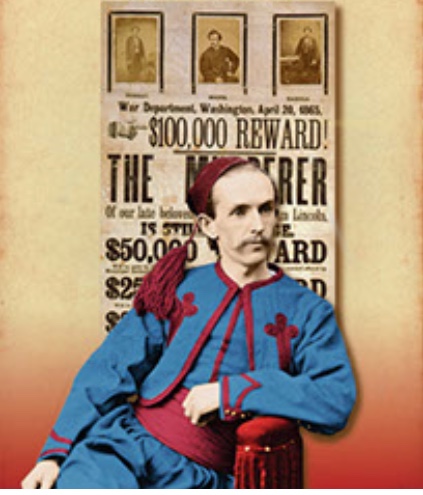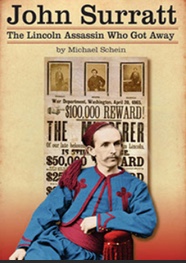This Meeting 150 Years Ago this Week Led to Lincoln’s Assassination

On December 23, 1864 a little-noticed event took place that would, in the fullness of time, shake the world. It was on that date that John Wilkes Booth and John Harrison Surratt first met.
 Booth
needs no introduction, but perhaps Surratt does. Surratt was Booth’s
closest associate for the four months prior to the assassination. He
recruited all four of the conspirators who were ultimately hung for
the crime of assassination – including his own mother. He was
also, by his own admission, a Confederate Secret Service operative,
with connections to the highest levels of the Confederate States of
America government in Richmond. Two weeks prior to the
assassination, Surratt met with Confederate Secretary of State Judah
P. Benjamin – and possibly with President Jefferson Davis – in
Richmond. Then he snuck back across the Potomac to Washington,
carrying dispatches tucked inside a book entitled The Life of John
Brown.
Booth
needs no introduction, but perhaps Surratt does. Surratt was Booth’s
closest associate for the four months prior to the assassination. He
recruited all four of the conspirators who were ultimately hung for
the crime of assassination – including his own mother. He was
also, by his own admission, a Confederate Secret Service operative,
with connections to the highest levels of the Confederate States of
America government in Richmond. Two weeks prior to the
assassination, Surratt met with Confederate Secretary of State Judah
P. Benjamin – and possibly with President Jefferson Davis – in
Richmond. Then he snuck back across the Potomac to Washington,
carrying dispatches tucked inside a book entitled The Life of John
Brown.
The particulars of what occurred in this first meeting are known to a remarkable extent. Star government witness Louis J. Weichmann – a Confederate sympathizer and Surratt house boarder-turned-informant to avoid prosecution – provides a picturesque reconstruction in his memoirs:
In the evening after dinner on that day, about six o’clock, while standing on the pavement in front of the Surratt house and having a very pleasant time with John, we agreed to take a stroll along Pennsylvania Avenue. I was anxious to purchase a few Christmas presents for my sisters. We went down Seventh Street together. It was a delightful evening. The store windows looked very gay. Surratt, I am sure, had no expectation of meeting any acquaintance, nor had I. When directly opposite Odd Fellows’ Hall someone suddenly called out, “Surratt, Surratt.” “John, someone is calling you,” said I. My companion, turning around, recognized an old friend from Charles County, Maryland, named Samuel A. Mudd.
Dr. Mudd was calling to Surratt for the purpose of introducing him to the handsome man at his side, John Wilkes Booth. Booth had stayed over at Mudd’s house in Maryland in November, and again on December 18. It is likely that Booth specifically asked Mudd to provide him with an introduction to Surratt, the daring young blockade runner who knew all the ways out of Maryland into Virginia. This is the same Dr. Samuel A. Mudd who would treat Booth’s broken leg in the early morning hours of April 15, 1865, shelter him for that first day following the assassination, and then pretend to pursuing Union troops not to know the “stranger” with the broken leg that he treated.
Weichmann’s memoirs claim that Mudd introduced Booth as “Mr. Boone,” and that it was not until they returned home that night that Surratt told him that “Boone” was Booth, the famous actor. Curiously, his trial testimony overlooks this point, naming Mudd’s companion “Booth,” which surely he was. Weichmann describes Booth at this first meeting:
I noticed that he was a young man of medium figure, apparently about twenty-eight years of age. A heavy black mustache rendered the pallor of his countenance very noticeable. He possessed an abundance of black curly hair and a voice that was musical and rich in its tones. His bearing was that of a man of the world and a gentleman. In dress, he was faultless.
At Booth’s invitation, the foursome went to his room at the National Hotel. Booth pulled a call bell and ordered up “milk punches and cigars for four.” Weichmann, ever fastidious, remarked upon the neatness of the room. Booth replied that it had previously been occupied by Senator Wilkeson, who’d left behind a sheaf of documents that would make “a nice read.” After sipping their drinks and making polite conversation for a while, Dr. Mudd called Booth out into the hallway, where they conversed for about five minutes. Then they called for Surratt, and the three of them conferred in the hall for another several minutes before returning. Mudd apologized to Weichmann, saying that Booth wanted to purchase his farm but would not offer enough for it. Booth and Surratt later offered the identical excuse, with Surratt explaining that the men wanted him as their agent for the transaction – an odd choice considering that Surratt now lived in Washington and had just met Booth. Surratt, Booth and Mudd then conferred at a table conveniently located (per Weichmann’s testimony) at a distance that made their speech audible but not intelligible, where they held an animated discussion of some twenty minutes duration. During the conversation, Booth made marks as if diagramming something on an envelope, while the other two men watched intently.
The foursome then adjourned to Dr. Mudd’s lodgings at the Pennsylvania House on C Street. Mudd and Weichmann talked together, while Booth and Surratt sat by the hearth. A distinct note of jealousy creeps into Weichmann’s account, as he strives to portray his friend Surratt as an innocent entrapped:
Boone [Booth] and Surratt, were meanwhile having a jolly time together, Boone taking letters and photographs from his pocket and exhibiting them to his companion, who, tossing his head in the air, replied with animated laughter. Probably by this time Surratt was duly impressed with the greatness of his new-found friend. . . . What pictures Boone drew before this country boy’s vision, what glittering baubles he held out to him, no one knows. Boone, at any rate, found him an easy victim, for from that hour Surratt was his, as completely as Doctor Faust belonged to Mephistopheles.
Whether Booth was Surratt’s puppeteer or equal partner is not clear. What we do know, from Surratt’s own confession in a lecture he delivered in Rockville, Maryland, is the main outline of what Booth proposed, either at that first meeting or over the course of several subsequent meetings. Surratt says that Booth “seemed to be very reticent with regard to his purposes,” but upon receiving Surratt’s assurance that “I am a Southern man,” Booth agreed to confide in him. First, Booth explained that his motives were to force the North to resume prisoner exchanges, because the South “cannot spare one man, whereas the United States Government is willing to let their own soldiers remain in our prisons because she has no need of the men.” According to Surratt:
There was a long and ominous silence, which I at last was compelled to break by asking, “Well, Sir, what is your proposition?”
He [Booth] sat quiet for an instant, and then, before answering me, arose and looked under the bed, into the wardrobe, in the doorway and the passage, and then said, “We will have to be careful; walls have ears.” He then drew his chair close to me and in a whisper said, “It is to kidnap President Lincoln, and carry him off to Richmond!”
“Kidnap President Lincoln!” I said. I confess that I stood aghast at the proposition, and looked upon it as a foolhardy undertaking. To think of successfully seizing Mr. Lincoln in the capital of the United States surrounded by thousands of his soldiers, and carrying him off to Richmond, looked to me like a foolish idea. I told him as much.
At this point in the tale, it seems that Surratt is going to balk at involvement in anything so risky. Then Booth explained “in minute detail” his plans, including the various parts each conspirator would play, and the possibility that Lincoln could be seized in one of his frequent rides to and from the Soldiers’ Home.
But the most amazing thing happens: see how quickly Surratt flips from resistance against to embrace of the plot:
I was amazed – thunderstruck – and in fact, I might also say, frightened at the unparalleled audacity of this scheme. After two days’ reflection I told him I was willing to try it.
Thus, in a public lecture in 1870, John Harrison Surratt confessed his complicity in a conspiracy with John Wilkes Booth to commit the felony of kidnapping the President of the United States. As no less a luminary than Jefferson Davis is reputed to have recognized, it was but a short step from kidnapping to murder.
©2014 Michael Schein, all rights reserved. Adapted from Michael Schein’s forthcoming book, John Surratt: The Lincoln Assassin Who Got Away (History Publishing Co., release April 14, 2015).
Sources: Louis J. Weichmann, A True History of the Assassination of Abraham Lincoln and the Conspiracy of 1865 (Floyd Risvold, ed., Alfred A. Knopf, NY 1975); “The Rockville Lecture” (Dec. 6, 1870), reprinted in, Weichmann, pp.428-40; Trial of John H. Surratt in the Criminal Court for the District of Columbia, (Washington: French & Richardson; Philadelphia: J.B. Lippincott & Co. 1867); Surratt Society, From War Department Files: Statements Made by the Alleged Lincoln Conspirators Under Examination, 1865 (Nov. 1980); Edward Steers, Jr., His Name is Still Mudd, (Thomas Publications, 2013); Ben Pitman, The Trial: The Assassination of President Lincoln and the Trial of the Conspirators (Edward Steers, Jr., ed., Univ. Press of Kentucky 2003); Michael W. Kaufman, American Brutus (Random House 2004); William Tidwell, James O. Hall and David Winfred Gaddy, Come Retribution: The Confederate Secret Service and the Assassination of Lincoln (Univ. Press of Mississippi 1988).
